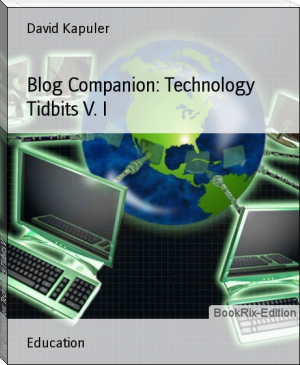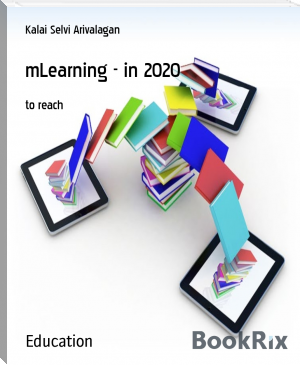INNOVATIONS IN SCIENCE, TECHNOLOGY AND MATHEMATICS EDUCATION IN NIGERIA by Ebele C. Okigbo, Nneka R. Nnorom, Ernest O. Onwukwe (the ebook reader .txt) 📖

- Author: Ebele C. Okigbo, Nneka R. Nnorom, Ernest O. Onwukwe
Book online «INNOVATIONS IN SCIENCE, TECHNOLOGY AND MATHEMATICS EDUCATION IN NIGERIA by Ebele C. Okigbo, Nneka R. Nnorom, Ernest O. Onwukwe (the ebook reader .txt) 📖». Author Ebele C. Okigbo, Nneka R. Nnorom, Ernest O. Onwukwe
Working well with other people, such as communication skills and other interpersonal skills;
Being reliable and dependable: doing what you say you will by the deadline you have agreed, and turning up when you are meant to be there; and
A willingness to learn new skills, whether those job-specific or more general.
Working well with other people: the skills require to-work well with other people are known as interpersonal skills. Good interpersonal skills allows you to participate effectively as a member of a team, satisfy customers’ and clients’ expectations, negotiate, make decisions and solve problems with other people, and generally work effectively with other employees. Interpersonal skills includes: Communication skills (verbal and non-verbal), listening, emotional intelligence, team-working, negotiation, persuasion and influencing skills, conflict resolution and mediation, problem-solving and decision making.
Being reliable and dependable: this basically means doing what you say that you will do. It also, however, means being able to look around and see what needs doing-and then do it. It requires a wide range of skills, mostly personal than interpersonal. You have to be organized by managing your time effectively. You have to be trustworthy and conscientious. You should be able to take responsibility for your own actions and ensure you live up to your value. Being reliable is using your initiative to identify where work needs doing and getting on and doing it. You have to be self-motivated and a creative thinker.
Willingness to learn new skills: it means being open to new ideas and experiences, and always looking to improve your skills and knowledge. Most times is refers to as personal development. There are, inevitably, a wide range of skills that could be useful to employers. Each of us has our own personal range of skills, and we therefore can each make a unique contribution to any organization. Learning to recognize and use your skills appropriately is essential. An open mind and willingness to embrace new ideas, is probably one of the most useful attribute that you can bring to any organization (Ogunbiyi, Ugodulunwa, Eze, Uwaleke, Igu, Ogba and Ekechukwu, 2019).
Need for Employability Skills for Chemistry Graduates
One of the aims of chemistry education is to build and produce graduates who can apply what they have learned in form of a skill. Thereby becomes either gainfully employed, employer of labor or self-employed. The Nigeria’s work environment is progressively changing, especially with globalization and the influx of advanced technology existing today in the commercial setting. Employers express dissatisfaction with the kind of skills and competence shown by chemistry graduates (Eze, 2010).While collaboration, analytical skills, manipulative skills and good communication which involve the appropriate use of both oral, written and information and communication technology were recommended for chemistry graduates in the place of work, Udosen, (2015) and Ajaero and Okoroafor (2018) explained that most of the skills especially the information and communication technology (ICT) skills taught in tertiary institutions showed a high difference in the ICT skills needed by employers.
Ajaero and Okoroafor (2018) further pointed out some of the employability skills needed by graduates to meet up with the expected challenges usually seen in the work place. They include: the ability to effectively manage and resolve conflict, understand team dynamics and appropriate response, teamwork and interpersonal skills, assume leadership role where/when necessary, negotiate acceptable solutions in a professional manner, organize and monitor performance, work productively and harmoniously with diverse cultures, recognize and respect similarities in a team, team work and interpersonal relationships and collaborate in a team environment.
Others are problem solving, analytical and critical appraisal skills, which enables students to: solve problems which solutions are clearly obvious;make timely decisions using available information; demonstrate the capacity for inquiry, logical thinking, inductive and deductive reasoning and critical examination; apply different problem solving strategy in a constructive way and identify and solve unfamiliar problems that require analytical skill and originality (Okeke,2015).Oral and written communication skills which enables the students to: defend an issue with the proper language required, respond adequately to questions asked, listen properly and comprehend different opinions, communicate in a very clear way with professional language needed, write clearly with appropriate language, prepare information in an understandable arrangement (Ajaero & Okoroafor, 2018). There are other basic skills needed by chemistry graduate which include: production skills, entrepreneurial skills, critical thinking skill, analytical skill and skills to identify a problem (Terwase, Ugodulunwa, Bulus, Ekechukwu, Uwaleke, Ogba, Igu & Eze, 2019).
The above substantiates the views of Osisioma (2012) and Uwaleke, Offiah and Okechukwu (2014) who stated that the basic objective of offering chemistry in Nigerian tertiary institutionsis for graduates to have skills that are in high demand in diverse sector. These include skills relating to numeracy, problem solving, team-work, organizational skills, project and time management skills, data analysis and communication of complex ideas. Graduate can work in industries including education, defense, health care, pharmaceutical companies and nature conservation. They can also work as secondary school teachers, research scientists, higher education lecturers, chemists, nature conservation officers, research scientists, production managers, quality control officers/analyst, health promotion specialists, and science writers. The training one received as a chemistry education graduate can prepare the person for other careers.
Skills needed by chemistry graduates are so enormous hence its value cannot be overemphasized. This corroborate the view of Eze (2010) that science and chemistry graduates with various skills would be required by employers because they would help in bringing required ideas to achieve success in the work place. Therefore, the need to introduce Learner-Centred Instruction Approach (LCIA) in our tertiary institution becomes very essential.
Learner-Centred Instruction Approach (LCIA) as an Innovative Approach to Improving Employability Skills
Learner-centred instruction approach (LCIA) is an innovative approach in teaching with the aim of making students become part of the teaching and learning process. Learners will be involved and active during teaching and learning process. The concept of LCIA according to Ajaero and Okoroafor (2018) was propounded in 1905 by Hayward and further expounded by Deway in 1956. Is a better approach than the conventional concept of learning where the teacher solely dispenses knowledge to the learner. LCIA is an innovative learning approach that grants the learner the opportunity to be active during teaching and learning. It is a modern teaching approach that allows the teacher to be the director or facilitator while ensuring that the learners comprehends and become involved in achieving the objective of the teaching and learning process. LCIA holds the students accountable for learning rather than the content of what the teacher is teaching, this is because knowledge cannot only be passed from teacher to students but also from student though their background experience and knowledge to bear on what they learnt so that they can have a better understanding of their learning task (Ajaero & Okoroafor, 2018; Stanbarg, 2007).
Ajaero and Okoroafor (2018) stated that all known active or collaborative learning has been found to bring about better understanding in learner than the conventional or passive approach of learning, which makes the teacher the focus of the lesson rather than the learner. Effective use and application of problem solving activities during teaching and learning helps the learner in areas such as, stimulations, case studies, group activities, role playing as learning approach enables learners have experiential knowledge and understanding, as well as develop employability skills such as problem solving skills, communication skills, teamwork, presentation, research, conflict resolution and interpersonal skills (Eison, 2010; Palanissamy, Syed & Kumar, 2017).
LCIA is also based on Bruner’s (1966) constructivist theory of learning which states that learning is an active process in which learners construct/acquire new knowledge/ideas based upon the current or past knowledge. The constructivist believes that effective learning takes place when students actively engage in the learning process by collaborating rather than learning on their own. It is through group interaction that learners relate what was taught to what they already know, reflect and hence construct knowledge. Bruner also states that meaningful learning is a cognitive process in which learners/individuals make senses of the world in relation to the knowledge and skills which they already acquired or have constructed. Bruner is a strong proponent of discovery learning which has to do with the acquisition of skills for employability. Brunner believes that in order to acquire meaningful learning, learners must explore and create something new using the available resource materials. Bruner’s theory suggests that children must be motivated and challenged to learn, but this should be within their level of maturational readiness and cognitive abilities. Hence, Brunner’s constructive learning theory provides the theoretical base for this paper which focused on improving the employability skill of chemistry graduates using learner-centred instruction approach.
Benefits of Learner-Centred Instruction Approach (LCIA)
Base on the literatures reviewed above, it has been established that learner-centred instruction approach is more beneficial than the conventional instruction approach. The reason is that LCIA:
builds stronger learner-teacher relationship;
takes into account learners diverse learning needs and interest and increases their retention of both knowledge and skills;
engages learners actively in learning, thereby reducing classroom disturbances;
improves students motivation and promotes peer communication;
instils greater confidence in learners since they are responsible for their own learning responsibilities;
develops characteristics of lifelong learning;
develops generic skills, such as communication, negotiation, decision making, problem solving and independent skills;
emphasizes effective communication of knowledge to address emerging and enduring problems in real life context;
Promotes learners innovation and creativity (Hawati, Ruzita, Aisha, Noor, Noor, & Muhamas, 2013, cited in Ajaero & Okoroafor, 2019).
Challenges Facing LCIAin Nigeria Tertiary Institutions
Teaching generally and chemistry teaching in particular is supposed to be result oriented and learner centered, and this can only be achieved when learners are willing and the teachers are favourably disposed, using the appropriate resources in teaching the learners. The application of LCIA in Nigerian tertiary education system is faced with so many challenges. Some of the challenges includes: non-professionalism of people teaching the subject, class size, poor infrastructural facilities, condition of service/teachers remuneration, lack of adequate workshop/laboratory and overloaded curriculum, to mention but a few.
Other challenges facing LCIA in Nigeria as opined by Omiko (2015) is the obsoleteness of equipment and dilapidated laboratories/workshops. Science subjects are experimental and practical subjects and its learning is of most value and effective when the learner is involved in the process of scientific investigation.
Effective teaching is vital in the application of LCIA. The problem of lack of teaching materials in schools hinders effective application of LCIA (Anyanwu, 2001). Materials resources including textbooks, students note, teachers guide, and other teaching resources also pose great challenge to the effective application of LCIA. Hence teachers in our tertiary institutions are facing the problem of lack of material resources and the potential skills for teaching and learning of science subjects.
Poor funding: most of the tertiary institutions in Nigeria are poorly funded; hence they do not have the requisite resources and infrastructure for learning. LCIA requires learning to take place in a conducive environment with adequate infrastructure, equipment’s and steady power supply, and most of the tertiary institution in Nigeria today cannot boost of having all this basic facilities and infrastructures to achieve their teaching and learning objective. Some of the topics teachers may intend to teach may require the presence of constant electricity supply, they may intend to deliver their lessons using a computer and projector,
 The desire to acquire knowledge about the surrounding world and human society is quite natural and understandable for a person. Life is so developed that an uneducated person will never occupy a high position in any field. Humanity in its mass, and each person individually, develops objectively, regardless of certain life circumstances and obstacles, but with different intensity. The speed of development depends on the quality of training.
The desire to acquire knowledge about the surrounding world and human society is quite natural and understandable for a person. Life is so developed that an uneducated person will never occupy a high position in any field. Humanity in its mass, and each person individually, develops objectively, regardless of certain life circumstances and obstacles, but with different intensity. The speed of development depends on the quality of training.




Comments (0)